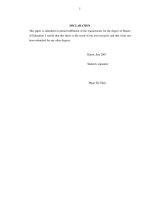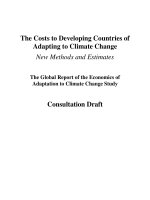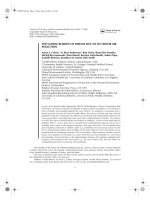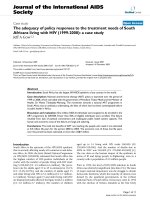The global development of policy regimes to combat climate change
Bạn đang xem bản rút gọn của tài liệu. Xem và tải ngay bản đầy đủ của tài liệu tại đây (2.84 MB, 281 trang )
THE GLOBAL DEVELOPMENT
OF POLICY REGIMES TO
COMBAT CLIMATE CHANGE
8949_9789814551847_tp.indd 1
27/2/14 9:27 am
THE TRICONTINENTAL SERIES ON GLOBAL ECONOMIC ISSUES
(ISSN: 2251-2845)
Series Editor: John Whalley (University of Western Ontario, Canada)
Published:
Vol. 1
General Equilibrium Global Trade Models
edited by John Whalley
Vol. 2
China’s Trade, Exchange Rate and Industrial Policy Structure
edited by John Whalley
Vol. 3
International Trade Agreements and Political Economy
edited by Raymond Riezman
Vol. 4
The Global Development of Policy Regimes to Combat Climate
Change
edited by Nicholas Stern, Alex Bowen and John Whalley
The Tricontinental Series on
Vol.
Global Economic Issues
4
THE GLOBAL DEVELOPMENT
OF POLICY REGIMES TO
COMBAT CLIMATE CHANGE
Editors
Nicholas Stern
London School of Economics and Political Science, UK
Alex Bowen
London School of Economics and Political Science, UK
John Whalley
University of Western Ontario, Canada
World Scientific
NEW JERSEY
•
LONDON
8949_9789814551847_tp.indd 2
•
SINGAPORE
•
BEIJING
•
SHANGHAI
•
HONG KONG
•
TA I P E I
•
CHENNAI
27/2/14 9:27 am
Published by
World Scientific Publishing Co. Pte. Ltd.
5 Toh Tuck Link, Singapore 596224
USA office: 27 Warren Street, Suite 401-402, Hackensack, NJ 07601
UK office: 57 Shelton Street, Covent Garden, London WC2H 9HE
Library of Congress Cataloging-in-Publication Data
Stern, N. H. (Nicholas Herbert)
The global development of policy regimes to combat climate change / by Nicholas Stern (London
School of Economics, UK), Alex Bowen (London School of Economics, UK), and John Whalley
(University of Western Ontario, Canada).
pages cm. -- (The tricontinental series on global economic issues, ISSN 2251-2845 ; vol. 4)
Includes bibliographical references and index.
ISBN 978-9814551847
1. Climatic changes--Government policy--Case studies. 2. Environmental policy--Case studies.
3. Sustainable development--Case studies. I. Bowen, Alex. II. Whalley, John. III. Title.
QC903.S832 2014
363.738'74561--dc23
2013038486
British Library Cataloguing-in-Publication Data
A catalogue record for this book is available from the British Library.
Copyright © 2014 by World Scientific Publishing Co. Pte. Ltd.
All rights reserved. This book, or parts thereof, may not be reproduced in any form or by any means,
electronic or mechanical, including photocopying, recording or any information storage and retrieval
system now known or to be invented, without written permission from the publisher.
For photocopying of material in this volume, please pay a copying fee through the Copyright Clearance
Center, Inc., 222 Rosewood Drive, Danvers, MA 01923, USA. In this case permission to photocopy
is not required from the publisher.
In-house Editors: Sandhya Venkatesh/Chitralekha Elumalai
Typeset by Stallion Press
Email:
Printed in Singapore
February 18, 2014
13:21
9in x 6in
b1657-fm
Global Development of Policy Regime. . .
Contents
About the Contributors
vii
About the Editors
xiii
Acknowledgments
xv
Introduction
Alex Bowen, Nicholas Stern and John Whalley
Chapter 1. Global Cooperation and Understanding to
Accelerate Climate Action
James Rydge and Samuela Bassi
Chapter 2. The US and Action on Climate Change
Samuela Bassi and Alex Bowen
xvii
1
23
Chapter 3. Challenges and Reality: China’s Dilemma on
Durban Platform Negotiation
Mou Wang, Huishan Lian and Yamin Zhou
63
Chapter 4. Sustainable Growth and Climate Change:
Evolution of India’s Strategies
Ruth Kattumuri and Darshini Ravindranath
75
Chapter 5. After Copenhagen and the Economic Crisis:
Does the EU Need to Go Back
to the Drawing Board?
Christian Egenhofer and Monica Alessi
v
107
February 18, 2014
13:21
vi
9in x 6in
b1657-fm
Global Development of Policy Regime. . .
Contents
Chapter 6. The Scope for “Green Growth” and a New
Technological Revolution
Alex Bowen
133
Chapter 7. Negotiating to Avoid “Dangerous”
Climate Change
Scott Barrett
159
Chapter 8. Unilateral Measures and Emissions Mitigation
Shurojit Chatterji, Sayantan Ghosal,
Sean Walsh and John Whalley
181
Chapter 9. Compliance Mechanisms in Global Climate
Regimes: Kyoto and Post-Kyoto
Sean Walsh and John Whalley
225
Index
251
February 18, 2014
13:21
9in x 6in
b1657-fm
Global Development of Policy Regime. . .
About the Contributors
Monica Alessi is a Programme Manager and Research Fellow at CEPS
since September 2006, in the Climate Change and Energy Policy Unit. She
is involved in research on different aspects of EU and international climate
change and energy policy, including the EU ETS, the role of cities to address
climate change, and the SET-Plan. Other focus of research includes EU
water policy. Before CEPS, she worked as a consultant for the International
Fund for Agricultural Development (IFAD) on the subject of genetically
modified organisms as well as auditing development projects. She graduated
with an MPhil in Environmental Policy from the University of Cambridge
in the United Kingdom.
Scott Barrett is the Lenfest-Earth Institute Professor of Natural Resource
Economics at Columbia University in New York City, where he holds a
joint appointment in the School of International and Public Affairs and the
Earth Institute. He was previously on the faculties of the Johns Hopkins
University School of Advanced International Studies in Washington, DC
and the London Business School. He has also been a visiting scholar at
Princeton and Yale. His research focuses on institutional remedies to global
collective action problems such as disease eradication, high seas overfishing,
and, of course, climate change.
Samuela Bassi is a Policy Analyst at the Grantham Research Institute on
Climate Change and the Environment at the London School of Economics
and Political Science and the Centre for Climate Change Economics and
Policy, where she focuses on green growth and climate change policy.
Previously, she worked as a Senior Policy Analyst at the Institute for European Environmental Policy, and for an Italian environmental consulting
company. She graduated in Economics from University of Trieste, Italy,
and holds an MSc in Economics from Birkbeck College, London.
vii
February 18, 2014
viii
13:21
9in x 6in
b1657-fm
Global Development of Policy Regime. . .
About the Contributors
Alex Bowen joined the Grantham Research Institute on Climate Change
and the Environment at LSE in 2008 as Principal Research Fellow, after
many years at the Bank of England, most recently as Senior Policy Adviser,
Monetary Stability. He first became involved in climate change issues when
seconded as lead economist to the Stern Review on the Economics of
Climate Change. His research interests include the design of public policies
for a low-carbon economy and the macroeconomic aspects of climate change
policies. He has been a consultant to a wide range of UK government
departments and international bodies, including the World Bank and
OECD. Dr Bowen has a BA in Economics from Cambridge University and
a PhD in Economics from the Massachusetts Institute of Technology, where
he studied on a Kennedy Scholarship.
Shurojit Chatterji is an economic theorist at the School of Economics,
Singapore Management University. His principal research field is Microeconomic Theory. He has worked on economic dynamics under learning,
on strategy proof mechanism design, and more recently on climate change
economics.
Christian Egenhofer has more than 25 years of experience on EU policy
analysis in the areas of energy, climate, environment, transport, and water.
Currently, he is Associate Senior Research Fellow and head of the Energy,
Climate and Environment Programme at the Centre for European Policy
Studies (CEPS) in Brussels. He is also Visiting Professor at the College of
Europe in Bruges (Belgium) and Natolin (Poland), SciencesPo, Paris and
Guido Carli LUISS University in Rome.
Sayantan Ghosal is a Professor of Economics at the Adam Smith
Business School, University of Glasgow. He was a Professor of Economics
at the University of Warwick from October 2004 to March 2013. He was
Research Director for the ESRC Centre for Competitive Advantage in the
Global Economy (CAGE) from 2010 to 2012 and continues his association
with CAGE as a Research Fellow. He obtained his PhD from CORE,
Universite Catholique de Louvain. His research is in economic theory and
its applications including foundations of general equilibrium; behavioral
welfare economics; internal constraints and deprivation traps; financial
crisis; endogenous formation of networks and groups; global cooperation
and climate change; long-run growth. He has published in a number of
peer-reviewed economic journals including the Journal of Economic Theory,
Economic Journal, Journal of Economic History, Journal of International
Economics, Games and Economic Behavior, Journal of Public Economics,
February 18, 2014
13:21
9in x 6in
b1657-fm
Global Development of Policy Regime. . .
About the Contributors
ix
Economic Theory, International Journal of Game Theory, Social Choice
and Welfare, and Journal of Mathematical Economics and has authored a
number of policy reports/briefings and media pieces.
Ruth Kattumuri is Co-Director of the Asia Research Centre and India
Observatory at the London School of Economics (LSE). With over 25 years
of experience in higher education, research, and policy engagement, she
has pioneered several innovative international research and development
programs. Her current research and policy publications and engagement
pertains to sustainable and inclusive green growth in Asia. Ruth is an
Associate with the Grantham Research Institute on Climate Change and
the Environment at the LSE and she is also a Cambridge Commonwealth
Fellow. Prior to joining the LSE, she was a Professor in Statistics and
Computer Science in Chennai, India.
Huishan Lian is working for the International Finance Corporation (IFC)
of the World Bank Group. She is An Access to Finance Operations Analyst
of the China Energy Efficiency Finance Program (CHUEE). Huishan Lian
has been studying and working in the climate change space since 2006
and was a delegate to UNFCCC COP 15 Copenhagen Conference. Apart
from the CHUEE Program, she is currently working in the China Emission
Trading Program and China Green Building Program in IFC. Prior to IFC,
she worked at the Chinese Academy of Social Science (CASS). Huishan
holds a Master’s degree in International Political Economy from the London
School of Economics and Political Science (LSE).
Darshini Ravindranath is currently pursuing her PhD with a focus
on the interactions between climate change and land-use change at the
Institute for Sustainable Resources at University College London (UCL).
She has worked as a Researcher at LSE’s Asia Research Centre, on green
growth and climate vulnerability and resilience. In the past, she has worked
as a consultant with Asian Development Bank (ADB) and UNDP, India.
She has also authored several reports for local authorities in the UK while
working as a sustainability consultant in London. Darshini holds an MSc
in Environment and Development from the LSE and a BA (Hons) in
Economics from the University of Manchester.
James Rydge is Dahrendorf Research Fellow at the Grantham Research
Institute on Climate Change and the Environment at the London School
of Economics and Political Science and the Centre for Climate Change
February 18, 2014
x
13:21
9in x 6in
b1657-fm
Global Development of Policy Regime. . .
About the Contributors
Economics and Policy. He works closely with Nicholas Stern, collaborating across a wide range of research areas, including on green growth,
international agreements, and energy and climate policy in developed and
developing countries. James has a PhD in Economics and a Master’s in
Finance from the University of Sydney. Previously, he worked at the Bank
of New York Mellon in London and PricewaterhouseCoopers in Sydney.
Nicholas Stern is IG Patel Professor of Economics and Government
at the London School of Economics and Chairman of the Grantham
Research Institute on Climate Change and the Environment. He has taught
and researched at Oxford, MIT and the Ecole Polytechnique and held
chairs at Warwick and the College de France and visiting professorships
at the People’s University of China and the Indian Statistical Institute.
He was Chief Economist of the European Bank for Reconstruction and
Development and of the World Bank. Lord Stern was Head of the UK
Government Economic Service 2003–2007, and led the Stern Review on the
Economics of Climate Change. He was knighted for services to economics
in 2004 and made a cross-bench life peer as Baron Stern of Brentford in
2007. He is currently President of the British Academy.
Sean Walsh is an economist and is a Research Associate from the
University of Western Ontario who has been studying the course of the
climate change negotiations, and how they may impact developing countries
in particular, for over 6 years. He has participated in an official UNEP
hosted session in Copenhagen.
Mou Wang, Dr in Science, Associate Professor, Research Centre for
Urban & Environmental Studies, Chinese Academy of Social Sciences.
Received his PhD in 2005, major in Environment and Climate Change
Process. Research interests include environment and social dimensions
of sustainable development, energy and development, post 2020 climate
architecture, and economics of the environment and natural resources, CDM
and Programmatic CDM issues.
John Whalley is a Professor of Economics at the University of Western
Ontario (Canada) and a Research Associate of the Centre for Competitive
Advantage in the Global Economy (CAGE) at the University of Warwick
(UK). He has published extensively both on climate change and on other
areas of applied economics. He is a Fellow of the Econometric Society and
a Fellow of the Royal Society of Canada.
February 18, 2014
13:21
9in x 6in
b1657-fm
Global Development of Policy Regime. . .
About the Contributors
xi
Yamin Zhou, a Postdoctoral Fellow in Institute for Urban and Environmental Studies, Chinese Academy of Social Science (CASS), assistant
research fellow in national institute of international strategy, CASS. The
main research interests are environmental economics, global governance,
sustainable development, and low-carbon development. The published
paper is related to how to control non-CO2 GHG emission in China,
green job development in China, and how to address climate change issues.
The translated books are about human risk and global governance and
energy economics. The author has taken part in several international
conferences, such as Doha climate change conference, and annual meeting
of international trade and finance association.
May 2, 2013
14:6
BC: 8831 - Probability and Statistical Theory
This page intentionally left blank
PST˙ws
February 18, 2014
13:21
9in x 6in
b1657-fm
Global Development of Policy Regime. . .
About the Editors
Alex Bowen joined the Grantham Research
Institute on Climate Change and the Environment at LSE in 2008 as Principal Research
Fellow, after many years at the Bank of
England, most recently as Senior Policy
Adviser, Monetary Stability. He first became
involved in climate change issues when seconded as lead economist to the Stern Review
on the Economics of Climate Change. His
research interests include the design of public policies for a low-carbon economy and
the macroeconomic aspects of climate change
policies. He has been a consultant to a wide range of UK government
departments and international bodies, including the World Bank and
OECD. Dr Bowen has a BA in Economics from Cambridge University and
a PhD in Economics from the Massachusetts Institute of Technology, where
he studied on a Kennedy Scholarship.
Nicholas Stern is IG Patel Professor of Economics and Government at the London School
of Economics and Chairman of the Grantham
Research Institute on Climate Change and the
Environment. He has taught and researched
at Oxford, MIT and the Ecole Polytechnique
and held chairs at Warwick and the College
de France and visiting professorships at the
People’s University of China and the Indian
Statistical Institute. He was Chief Economist
of the European Bank for Reconstruction
and Development and of the World Bank.
xiii
February 18, 2014
xiv
13:21
9in x 6in
b1657-fm
Global Development of Policy Regime. . .
About the Editors
Lord Stern was Head of the UK Government Economic Service 2003–2007,
and led the Stern Review on the Economics of Climate Change. He was
knighted for services to economics in 2004 and made a cross-bench life peer
as Baron Stern of Brentford in 2007. He is currently President of the British
Academy.
John Whalley is a Professor of Economics at
the University of Western Ontario (Canada)
and a Research Associate of the Centre for
Competitive Advantage in the Global Economy (CAGE) at the University of Warwick
(UK). He has published extensively both on
climate change and on other areas of applied
economics. He is a Fellow of the Econometric
Society and a Fellow of the Royal Society of
Canada.
February 18, 2014
13:21
9in x 6in
b1657-fm
Global Development of Policy Regime. . .
Acknowledgments
The editors would like to acknowledge the support of the Centre for Climate
Change Economics and Policy (CCCEP) at the Grantham Research Institute on Climate Change and the Environment, London School of Economics
and Political Science, and of the Centre for Competitive Advantage in
the Global Economy (CAGE) at the University of Warwick (UK). Both
research centres are designated research centres of the UK Economic and
Social Research Council, for whose support and funding we are grateful.
Financial support was also provided through the China Policy and Research
Group (CPRG) at the University of Western Ontario (Canada) for the
participation of Chinese researchers in the project. CPRG acknowledges
support from the Ontario Research Fund.
xv
May 2, 2013
14:6
BC: 8831 - Probability and Statistical Theory
This page intentionally left blank
PST˙ws
February 18, 2014
13:21
9in x 6in
b1657-fm
Global Development of Policy Regime. . .
Introduction
Alex Bowen and Nicholas Stern
Centre for Climate Change Economics and Policy,
Grantham Research Institute on Climate Change and the Environment,
London School of Economics and Political Science (LSE),
Houghton Street, London WC2A 2AE
and
John Whalley
University of Western Ontario,
The Centre for International Governance Innovation and NBER
1. Background
The importance of the problem of human-induced climate change has
become glaringly evident over the past 25 years. Reflecting its global
relevance, it has become deeply embedded in the structures of the
United Nations (UN) since the late 1980s. The UN involvement started
with the Intergovernmental Panel on Climate Change, established in
1988 by two UN bodies, the World Meteorological Organization and
the United Nations Environment Programme, to assess “the scientific,
technical and socioeconomic information relevant for the understanding
of the risk of human-induced climate change,” providing a mechanism to
filter and distil scientific research findings. These have fed into country
negotiations through the UN Framework Convention on Climate Change
(UNFCCC) process, inaugurated at the UN Conference on Environment
and Development in Rio de Janeiro in 1992. This process works through
the “Conferences of the Parties” (or COPs), which provide the focus for
substantive negotiations and develop agendas for subsequent meetings.
Much has been learnt about the science, ethics and political economy of
climate change, and a number of national and international initiatives to
reduce greenhouse gas emissions have been launched, stimulated by the
UNFCCC discussions, but so far global actions have been modest and not
on the scale required to meet global aspirations.
xvii
February 18, 2014
xviii
13:21
9in x 6in
b1657-fm
Global Development of Policy Regime. . .
Introduction
Reminiscent of the negotiating rounds in the General Agreement on
Tariffs and Trade (GATT) and later in the World Trade Organization
(WTO), COP meetings are intended to discuss matters broadly related
to climate change, and from time to time, move forward to substantive
treaty-like negotiations.
The first of these occurred in 1997 at the COP 3, when the Kyoto
Protocol was negotiated. This divided the world into a group of countries
(effectively “developed countries”) making commitments to limit emissions
in various ways related to a 2012 benchmark, and a larger group of
developing countries, which were not subject to any limitations. This was
an embodiment of the principle agreed at the birth of the UNFCCC,
under which developing countries were to be subject to “common but
differentiated responsibilities.” Kyoto, however, proved to be weak discipline for a number of reasons. The Senate of the US, the largest emitter at
the time, failed to ratify the treaty, so the US did not implement it. Nor did
Australia, with one of the highest levels of greenhouse gas emissions per
capita on the planet. Mechanisms for assessing compliance were vague, and
there was very little by way of effective measures to enforce compliance.
More recently, two key countries, Canada and Japan, have withdrawn from
the Protocol. It has been left with little force or impact outside Europe,
although it may have helped develop monitoring, verification and reporting
regimes and stimulated some development of carbon markets. This has
inevitably meant that subsequent attempts to conclude a global deal to fight
climate change have first had to strengthen the foundations for agreement.
The more recent Bali Road Map process effectively became the second
round of global negotiations on climate change policy, initiated by nations’
desire to have a global regime in place at the end of the first Kyoto
Protocol implementation period in 2012. This began within a COP meeting
in Bali in December 2007 (COP 13) that greatly broadened the scope of the
UNFCCC discussions to include the four elements of mitigation, adaptation,
finance and innovation. The aim was to come to a comprehensive global
agreement at COP 15 in Copenhagen in 2009. However, the UNFCCC
negotiators were unable to travel quite that far. The Copenhagen Accord,
agreed at COP 16 in Cancun, primarily embedded in an international
agreement pre-existing unilateral commitments made by parties (although
many of those commitments were probably made with an eye on the need to
strengthen countries’ negotiating positions at the Copenhagen COP). The
two substantive innovations, or elements of progress, were the support for
the Accord from both the US and the larger developing countries, led by
February 18, 2014
13:21
9in x 6in
b1657-fm
Introduction
Global Development of Policy Regime. . .
xix
India and China. The hope was that more substantive commitments were
to follow, and many countries have indeed volunteered stronger national
action plans to reduce greenhouse gas emissions relative to “business as
usual.” The Copenhagen–Cancun targets of the USA, China, and the EU
look likely to be met. But for progress after 2020, COP 21 is key. This will be
in Paris at the end of 2015, preceded by COP 20 in Lima at the end of 2014.
The commitment to the UNFCCC process as a framework for negotiation also remains. COP 17 in Durban in 2011 adopted the “Durban
Platform for Enhanced Action,” which agreed to “launch a process to
develop a protocol, another legal instrument or an agreed outcome with
legal force . . . applicable to all parties” by 2015, which would enter into
force by 2020. COP 17 also recognized the gap between existing pledges
and commitments and the 2◦ C target, the temperature objective agreed by
UNFCCC participants. Progress toward a strong deal in 2015 is slow and
uncertain, with only very little advance at COP 18 in Doha in 2012 and
COP 19 in Warsaw, in late 2013. The UNFCCC executive is planning to
table at COP 20 in Lima a draft for agreement in Paris a year later.
This volume contains nine chapters dealing with various aspects of
global climate change negotiations, principally under the 1997 UNFCCC,
touching on the 1992 Kyoto negotiations and the process of implementation
that followed, the later (December 2007) Bali Road Map process culminating in the 2011 Durban COP, and the prospects beyond for whatever may
follow.
The chapters develop analysis of the post-Durban outlook in various
ways and set out a number of country perspectives, including those of key
developing countries, China and India, on the state of play and perspectives
on some key negotiation issues. The issue of implementation through
enforcement arrangements and the merits of alternative approaches, including multilateralism, are also considered.
It is evident that there is a strong commitment around the world to
the established UN institutions and processes within which the search for
further agreed actions will occur. The volume does, however, highlight the
large gaps that still exist between developed and developing countries,
as well as the limited achievements of the Kyoto Protocol, one of the
building blocks for future constraints on emissions. The chapters note
some of the major problems arising from varying interpretations of the
“common but differentiated responsibilities” of developing countries agreed
as part of the UNFCCC, as well as of historical responsibility for emissions.
When combined with other issues, such as the choice of consumption or
February 18, 2014
13:21
9in x 6in
b1657-fm
xx
Global Development of Policy Regime. . .
Introduction
production as the basis for mitigation commitments, the appropriate time
frame and base date for their measurement and whether level or intensity
commitments are to be negotiated, one can see that the challenges that
need to be overcome are considerable. Strong political will and civic action
are required. It is against this background that the papers in the volume
proceed.
2. The Global Perspective
In their broad introductory chapter to the volume, “Global Cooperation and
Understanding to Accelerate Climate Action,” James Rydge and Samuela
Bassi argue that, partly as a result of the global negotiations, public policy
on climate change now has a far higher profile than six or seven years ago.
However, as was recognized in Durban, even the emissions targets for 2020
leave a major gap between what is planned and what is consistent with
a (50–50 chance) 2◦ C path by 2050. They look more consistent with a
distribution of the possible temperature increase centered around 3.5–4◦ C.
The authors suggest that, to be consistent with a 2◦ C path, global emissions
would need to fall by a factor of 2.5 and emissions intensity by a factor of
seven or eight: a major global industrial revolution. They suggest that the
rate and direction of technical progress are encouraging but must accelerate
and that the low-carbon industrial revolution to come will benefit from
overlap with waves of technical change in information, communications and
technology and biotech. They suggest, there should be a broad approach
to encouraging new technology, as it would be a mistake to close off any
option. Richer countries need to think through how best to rejuvenate their
economies and there is great potential for low-carbon growth that at the
same time will help to encourage stronger action in the developing world.
They argue that strong action could see an intense period of innovation and
discovery across the board, with top-down (collective international action)
and bottom-up (national policy) approaches both important to action on
the scale required.
3. Country and Regional Perspectives
The volume investigates perspectives on climate change policy prospects
from the vantage points of the US, India, China and the EU.
In their chapter, “The US and Action on Climate Change,” Samuela
Bassi and Alex Bowen note that the US is currently the second biggest
February 18, 2014
13:21
9in x 6in
b1657-fm
Introduction
Global Development of Policy Regime. . .
xxi
emitter of greenhouse gases and one of the highest ranked in terms of per
capita emissions. The country will have to cut emissions more sharply than
others if a UNFCCC agreement to seek a 2◦ C ceiling to global warming
is to be fulfilled. Fortunately, however, despite non-participation in the
execution of Kyoto targets, there are some grounds for limited optimism.
At international level, the US is becoming less of an outlier. It had a
pivotal role in Copenhagen in helping to shape the Copenhagen Accord.
The approach endorsed at Durban and building on Copenhagen, with an
increased emphasis on the need for developing countries to participate in
emissions control, fits well with the US position. Also, given the weakness of
federal policy to reduce emissions, the emissions intensity of the economy
has fallen remarkably. New actions are being taken at federal, state and
local levels so that, in the words of one academic observer, “the reality
surpasses the rhetoric” (Stavins, 2012). They suggest that, domestically,
US climate change policies need more coherence and ambition, and are
being held back by widespread political opposition. They argue that the
introduction of a single carbon price across the American economy would
improve the cost effectiveness of climate change mitigation, speed the
introduction of clean energy technology, reduce investor risks and create
a level playing field across states.
Wang Mou, Lian Huishan and Zhou Yamin, in “Challenges and Reality:
China’s Dilemma about the Durban Platform Negotiation,” note that at
the 2011 Durban Conference, the UNFCCC adopted a series of decisions,
including a second commitment period for the Kyoto Protocol and a
new mandate for the Durban Platform. This outcome could symbolize a
significant milestone in the global climate negotiations. But behind this
positive progress, divergences of parties on key issues such as the sources
and scale of finance mechanisms, technology transfer, emission reduction
targets and the legal form of the outcome have not been substantially
resolved. In 2012, a complicated negotiation scenario emerged, with three
parallel negotiation tracks operating under two UNFCCC mandates. To
minimize the deep divide between the North and South on main negotiation
issues, key sticking points may be moved to the Durban Platform and
negotiated under this new track. The Durban Platform as a new negotiation
mandate has taken center stage in the global community. Key negotiation
issues such as the principle of “common but differentiated responsibilities,”
the issue of legal form and the framework, agenda, roadmap and timetable
of the Durban Platform remain to be addressed in future negotiations.
They suggest that China may be willing to participate actively and
constructively in the Durban platform negotiation, but any expectation that
February 18, 2014
xxii
13:21
9in x 6in
b1657-fm
Global Development of Policy Regime. . .
Introduction
China will pledge more aggressive emission reduction actions goes against
its social and economic development trajectory, which is the dilemma of
China’s participation in climate negotiations. China as the “factory of the
world” is on a fast track of urbanization and industrialization. It shoulders
the imperatives to alleviate poverty and narrow domestic regional gaps
in living standards. Its coal-based resource endowment and inefficient
technologies provide challenges to the curbing of emissions. Decoupling of
GHG emissions from social and economic development is a conundrum not
just for China but also the world.
Despite these challenges, China agreed to the adoption of the Durban
Mandate to initiate negotiations on a post-2020 international climate
regime. This regime, they suggest, must be built on the basis of mutual
respect and equity in accordance with collective responsibility, and take
full account of the right to development of developing countries and their
financial and technology constraints in fighting climate change. Unrealistic
emission reduction targets and unfair “burden-sharing” mechanisms for
developing countries will, they argue, neither facilitate the negotiation
nor contribute to international cooperation in addressing climate change.
Interestingly, and potentially very significantly, the discussions around the
13th Five-Year Plan, which are gathering pace in 2014, suggest that China
may be moving to strengthen its targets. The reasons include increasing
recognition of its own vulnerability, of the scale of its own emissions, of the
local environmental damage to its cities from air and water pollution and
of the potential markets for low-carbon goods services, and technologies.
In their chapter on India, entitled “Sustainable Growth and Climate
Change: Evolution of India’s Strategies,” Ruth Kattumuri and Darshini
Ravindranath argue that, with its population of over 1.2 billion and
its vulnerability, its history of low per-capita emissions and because of
its democratic, cultural, political and scientific strengths, India is a key
player in the global climate change debate. They suggest that it has been
playing an increasingly constructive role in recent international climate
change negotiations. For example, in Cancun, Jairam Ramesh (then India’s
environment minister and lead negotiator) suggested the idea of “equitable
access to sustainable development” as a new interpretation of “common but
differentiated responsibilities”. India is one of the nations most insistent on
equity requiring strong action by and financial support from developed
countries as a pre-condition for commitment by developing countries. This
language is positive and dynamic, moving away from the language of
burden-sharing, which suggests, misleadingly, a zero-sum game. India is
February 18, 2014
13:21
9in x 6in
b1657-fm
Introduction
Global Development of Policy Regime. . .
xxiii
progressing in the right direction in its 12th Five-Year Plan objectives for
faster, sustainable and more inclusive growth. The country’s objectives
are achievable but will require faster and stronger action still; efficient
implementation strategies; greater co-ordination among states and among
sectors; stronger public–private partnerships; and enhanced international
collaborations.
Christian Egenhofer in “After Copenhagen and the Economic Crisis:
Does the EU Need to Go Back to the Drawing Board?” raises the question,
does the European Union need to go back to the drawing board to design its
climate change mitigation policy? He sets out the EU’s policy approach in
the run-up to the Copenhagen Conference of the Parties to the UNFCCC,
built on the foundation of the long-term target of keeping the global
temperature increase since the pre-industrial era to 2◦ C or less. The EU had
been keen to take on a global leadership role, setting an example by adopting
an ambitious set of climate change and energy policies and thus preparing
a path towards a global deal. This enthusiasm was bolstered by the desire
to tackle problems in the energy sector such as worsening energy security,
energy inefficiency, lack of investment in energy systems and volatile but
generally rising energy prices. Policy-makers also saw an opportunity to
establish a competitive advantage in low-carbon technologies. European
policies in the near term were to be driven by the “20-20-20 by 20” targets
for emissions reductions, deployment of renewable energy and improvements
in energy efficiency by the year 2020. The centerpiece of the policy edifice
was the EU Emissions Trading System (EU ETS).
The adoption of a set of EU-wide policy objectives was only made
possible by a complex arrangement of burden-sharing based on a mixture of
efficiency and equity considerations. Subsequent experience has undermined
the edifice. Copenhagen failed to come up with a Kyoto Protocol Mark
Two, casting doubt on the EU’s attachment to quantitative emissions
reduction targets. The global economic downturn, combined with design
faults, weakened both EU ETS carbon prices and global carbon market
instruments such as the Clean Development Mechanism.
Egenhofer details the evolution of the EU ETS as policy-makers have
attempted to correct its design flaws. But he emphasizes the lack of
ambition embodied in the EU’s 2020 emission reduction targets in the wake
of economic crisis, arguing that they are probably inconsistent with the
EU’s long-term climate goals, the desire to facilitate a strong global deal
and the need to generate substantial flows of funds to developing countries
through international carbon markets. As a result, Egenhofer concludes
February 18, 2014
xxiv
13:21
9in x 6in
b1657-fm
Global Development of Policy Regime. . .
Introduction
post-Durban that the EU needs to consider more radical adjustments,
such as raising the 2020 emissions reduction target and, in the EU ETS,
introducing stronger market oversight and price stabilization mechanisms.
But more fundamentally, the challenge for Europe post-Durban is to
reconsider the central role of an emissions trading system in its domestic
policies in the absence of a global climate change agreement based on
national targets and commitments in a common metric.
4. Issues and Negotiating Approaches
Alex Bowen in “The Scope for ‘Green Growth’ and a New Technological
Revolution” argues that there is much evidence that high-carbon growth
will eventually become a contradiction in terms, or, as Stern puts it,
“high-carbon growth would kill itself” (Stern, 2010). This paper considers
the implications for growth of the findings of the literature on climatechange mitigation costs and then considers the additional elements from
the emerging “green growth” literature. The broad conclusion is that
well-designed action against climate change could improve well-being for
people in the near term as well as over the longer term. A concerted
attack on market and policy failures to halt climate change would increase
static efficiency and might generate higher growth in the short to medium
term as well as the longer term, especially if it stimulated innovation and
investment. This perspective, if sufficiently convincing to negotiators, could
make reaching an international agreement post-Durban easier, reducing the
emphasis on burden-sharing. But the potential size of near-term gains is
highly uncertain and it may still make sense to make greater investments
now to underpin sustainable development in the future.
Scott Barrett in “Negotiating to Avoid ‘Dangerous’ Climate Change”
is more sceptical about the prospects for progress toward a global deal
along Kyoto lines. He notes that, although countries have agreed what they
need to do collectively to avoid “dangerous” climate change, they have
failed so far to put in place the measures necessary to ensure that their
agreed goal will be met. Negotiators need to agree how the goal is to be
achieved and how the necessary actions are to be sustained. Compliance
is the real problem and will not be solved simply by good negotiating
skills. Somehow effective incentives need to be put in place for countries
to participate and comply with a global agreement limiting emissions.
Barrett sees the threat as being that the world could pass a threshold
beyond which the costs of climate change rise sharply, and irreversibility









